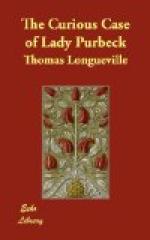This letter may be taken as evidence of Purbeck’s lunacy. On the other hand it might possibly, if not plausibly, be argued that it may only mean that he was in a very bad state of bodily health accompanied by great mental depression. Some readers of these pages may have experienced the capabilities of a liver in lowering the spirits.
As Lady Purbeck says, her mother had now “lost the good opinion” of Buckingham, and undoubtedly this was because she had refused to increase his brother’s allowance. So early as 28th November, 1618, John Pary wrote to Carleton,[59] regretting that he had not applied to Lady Bedford to use her influence in order to obtain a certain appointment, instead of applying to Lady Elizabeth, who had fallen out with Buckingham, and now had no influence whatever with him.
Lady Elizabeth, therefore, after having risen by her own skill to be one of the most influential women in England—perhaps the most influential—and that in the face of enormous difficulties, was beginning to fall from her high estate. And besides the bitter disappointment of the loss of influence and of royal smiles, a grievous and humiliating family sorrow was in store for her.
These pages do not constitute a brief on behalf of Lady Purbeck. It is desired that they should do her justice—full justice; but too little is recorded of her personal character to permit any attempt to portray it in detail, or even to make a bold sketch of its principal features. Of her circumstances it is much easier to write with confidence. We have already learned much about them. We have seen that she was brought up in an atmosphere of perpetual domestic discord, ending in a physical struggle between her father and her mother for the possession of her person: that she was afterwards flogged until she consented to make a marriage contract with a man much older than herself, whom she disliked intensely—a form of marriage which was no marriage, as her will for it was wanting and she was literally forced into it, if any girl was ever forced into a marriage.
An old husband hateful to a young wife would become yet more unattractive if he became insane, or eccentric, or even an irritable invalid. Then his change of religion would most likely annoy her extremely. Whether a husband leaves his wife’s religion for a better or a worse religion, it is equally distasteful to her.
Her condition would be made still further miserable when she was turned out of her own home, and practically robbed of her own possessions, luxuries and comforts. From what we have seen of her mother, it is difficult to believe that she was a tenderhearted woman, to whom a daughter would go for consolation in her affliction: nor could that daughter place much confidence in a mother who had once deceived her with a forged letter. To her father, who had treated her with great brutality and had sold her just as he might have sold a beast among his farm stock, she would be still less likely to turn for comfort or for counsel. Add to all this that, as the wife of an official in Prince Charles’s household, and as the sister-in-law of the reigning favourite, she was a good deal at the Court of James I. at a time when it was one of the most dissolute in Europe; and it will be easy to recognise that her whole life had been spent in unwholesome atmospheres.




